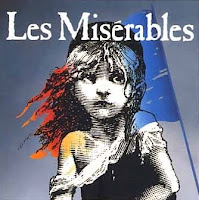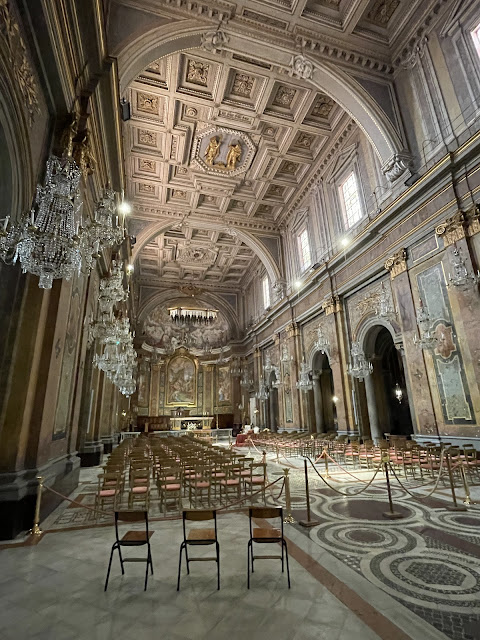The Imitation of Christ
Although this phrase is associated with the spiritual classic by Thomas a Kempis, the notion of saintliness by trying to follow the way of life Christ teaches us is found in many spiritual writers and in many great works of western literature.
One with a distinctive musical expression is based on the novel by Victor Hugo, Les Miserables. Rarely do epic stories translate easily to the stage. In recent years in Toronto we experienced an attempt with Lord of the Rings and earlier with Napoleon. Hugo's novel is expansive but the play introduces us very successfully to a panorama of characters presenting very different attitudes toward life. Some of the most attractive end up being the most retrograde.
 The conversion of Jean Valjean, the central character, is subtle and realistic. The play begins with his release from an unjust sentence of ten years for petty theft. He is bitter, and understandably so. When a bishop offers him hospitality, a warm meal and bed, Valjean sneaks out in the middle of the night with silver candle sticks that he can cash in.
The conversion of Jean Valjean, the central character, is subtle and realistic. The play begins with his release from an unjust sentence of ten years for petty theft. He is bitter, and understandably so. When a bishop offers him hospitality, a warm meal and bed, Valjean sneaks out in the middle of the night with silver candle sticks that he can cash in.
When found by the authorities, rather than turn him in, the bishop offers further generosity by giving him even more silverware. He then addresses Valjean alone and admonishes him to see his life as now being "bought for God". While a bit of a salesman's trick, Valjean begins to reflect on his life. He leaves behind his old identity and embraces a new one. This departure from the past both violates his parole and yet is a kind of baptism into a new life of goodness. While written long after the French Revolution, Hugo's preference for true justice over the letter of the law is clear.
This story was very controversial with the Church at the time of its writing. It portrays quite modern ideas of sainthood. Now it is much easier to read Valjean as a saint whose love is clearly shown to be Christ-like. Throughout the story he is a man of his times, doing good where he can. It is his love for others that is victorious in the end, not the student revolt against the government of the day that also figures in the story. "To love another person is to see the face of God," is peacefully proclaimed at the end of Valjean's earthly journey. He sings of his faithfulness to the promises he made:
On this page,
I write my last confession.
Read it well, when I at last am sleeping.
It's a story of those who always loved you.
Your mother gave her life for you,
then gave you to my keeping.
. . . Forgive me all my trespasses and take me to Your Glory.
Valjean shows us that there are saints among us, saints who arise from difficult circumstances, saints of profound love and commitment. While the range of characters we encounter in life do include even some of the despicable sorts Hugo shows us in the story, there is great goodness to be found. Valjean has many helpers and allies who support him as he strives to live a selfless life of love. Maybe you and I are ones called to be like Valjean too.
One with a distinctive musical expression is based on the novel by Victor Hugo, Les Miserables. Rarely do epic stories translate easily to the stage. In recent years in Toronto we experienced an attempt with Lord of the Rings and earlier with Napoleon. Hugo's novel is expansive but the play introduces us very successfully to a panorama of characters presenting very different attitudes toward life. Some of the most attractive end up being the most retrograde.
 The conversion of Jean Valjean, the central character, is subtle and realistic. The play begins with his release from an unjust sentence of ten years for petty theft. He is bitter, and understandably so. When a bishop offers him hospitality, a warm meal and bed, Valjean sneaks out in the middle of the night with silver candle sticks that he can cash in.
The conversion of Jean Valjean, the central character, is subtle and realistic. The play begins with his release from an unjust sentence of ten years for petty theft. He is bitter, and understandably so. When a bishop offers him hospitality, a warm meal and bed, Valjean sneaks out in the middle of the night with silver candle sticks that he can cash in.When found by the authorities, rather than turn him in, the bishop offers further generosity by giving him even more silverware. He then addresses Valjean alone and admonishes him to see his life as now being "bought for God". While a bit of a salesman's trick, Valjean begins to reflect on his life. He leaves behind his old identity and embraces a new one. This departure from the past both violates his parole and yet is a kind of baptism into a new life of goodness. While written long after the French Revolution, Hugo's preference for true justice over the letter of the law is clear.
This story was very controversial with the Church at the time of its writing. It portrays quite modern ideas of sainthood. Now it is much easier to read Valjean as a saint whose love is clearly shown to be Christ-like. Throughout the story he is a man of his times, doing good where he can. It is his love for others that is victorious in the end, not the student revolt against the government of the day that also figures in the story. "To love another person is to see the face of God," is peacefully proclaimed at the end of Valjean's earthly journey. He sings of his faithfulness to the promises he made:
On this page,
I write my last confession.
Read it well, when I at last am sleeping.
It's a story of those who always loved you.
Your mother gave her life for you,
then gave you to my keeping.
. . . Forgive me all my trespasses and take me to Your Glory.
Valjean shows us that there are saints among us, saints who arise from difficult circumstances, saints of profound love and commitment. While the range of characters we encounter in life do include even some of the despicable sorts Hugo shows us in the story, there is great goodness to be found. Valjean has many helpers and allies who support him as he strives to live a selfless life of love. Maybe you and I are ones called to be like Valjean too.

